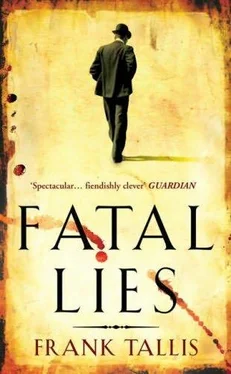Frank Tallis - Fatal Lies
Здесь есть возможность читать онлайн «Frank Tallis - Fatal Lies» весь текст электронной книги совершенно бесплатно (целиком полную версию без сокращений). В некоторых случаях можно слушать аудио, скачать через торрент в формате fb2 и присутствует краткое содержание. Жанр: Исторический детектив, на английском языке. Описание произведения, (предисловие) а так же отзывы посетителей доступны на портале библиотеки ЛибКат.
- Название:Fatal Lies
- Автор:
- Жанр:
- Год:неизвестен
- ISBN:нет данных
- Рейтинг книги:3 / 5. Голосов: 1
-
Избранное:Добавить в избранное
- Отзывы:
-
Ваша оценка:
- 60
- 1
- 2
- 3
- 4
- 5
Fatal Lies: краткое содержание, описание и аннотация
Предлагаем к чтению аннотацию, описание, краткое содержание или предисловие (зависит от того, что написал сам автор книги «Fatal Lies»). Если вы не нашли необходимую информацию о книге — напишите в комментариях, мы постараемся отыскать её.
Fatal Lies — читать онлайн бесплатно полную книгу (весь текст) целиком
Ниже представлен текст книги, разбитый по страницам. Система сохранения места последней прочитанной страницы, позволяет с удобством читать онлайн бесплатно книгу «Fatal Lies», без необходимости каждый раз заново искать на чём Вы остановились. Поставьте закладку, и сможете в любой момент перейти на страницу, на которой закончили чтение.
Интервал:
Закладка:
Liebermann leaned back in his chair.
“I don't think so. You could never have foreseen your husband's actions.”
“I'm his wife. I should have-”
“Not in this instance, Frau Becker,” Liebermann interrupted. “The man you fell in love with no longer exists. You said earlier that your husband changed. I believe that this alteration in his personality had a very specific cause.”
“I don't understand.”
“Are you aware that your husband took medicine-a white powder which he dissolved in alcohol?”
“Yes. He took it for his headaches.”
“Frau Becker, your husband never suffered from headaches. He was deceiving you. The medication he took was an extract of the South American coca plant-cocaine. It is a substance once thought to improve mood and increase… stamina.”
A carriage drew up outside, and Liebermann was momentarily distracted.
“Forgive me for being forthright, Frau Becker,” Liebermann continued. “But it is my belief that your husband-being considerably older than you-doubted his ability to satisfy a healthy young wife. He started taking cocaine, having probably heard of its use as a tonic by the German army. However, cocaine is a highly addictive substance that, taken in large quantities, can disturb the mind's delicate balance. It can cause various forms of paranoia, a particularly disturbing example of which is pathological or morbid jealousy.” A loud knock resounded through the house. “Men are particularly prone to jealous feelings-but these can be grotesquely exaggerated under the influence of such a potent chemical agent. If Dr. Becker had not been addicted to cocaine, I very much doubt whether he would have behaved so irrationally-and with such tragic consequences.”
There was the sound of movement in the hallway, and a gentle tap on the door.
“Come in,” said Frau Becker.
The maid entered.
“What is it, Ivana?”
“Frau Becker, a police constable has arrived. He would like to speak with you.”
“You had better show him in.”
Liebermann looked at Rheinhardt quizzically, but the inspector was only able to respond with a shrug.
Haussmann stepped out of the way to let in the constable-a large youth with ruddy cheeks and a forelock of orange hair that peeped out from beneath his spiked helmet. He looked around the room, observing the gathering, but seemed quite unable to explain his presence. Indeed, his expression suggested confusion-complicated by anxiety.
Rheinhardt stood up and introduced himself, which did not seem to help matters. Indeed, the constable now seemed even more nervous and shifted the weight of his body from one foot to the other.
“Well, man,” said Rheinhardt, becoming impatient. “What is it?”
“Sir,” said the constable. Then, looking toward Frau Becker, he said, “Madam… there's been an accident. A carriage left the road and the driver was thrown off! The landlord of the inn at Aufkirchen was passing-and he has identified the body. I am sorry, madam. Your husband… he's dead.”
Through the window Liebermann could see the city lights: rings of increasing intensity contracting around a central luminescent hub. This pool of stardust was home to nearly two million people. Germans, Italians, Slovaks, Poles, Ruthenians, Slovenians, Romanians, Gypsies, Catholics, Jews, Muslims, princes, archdukes, shop girls, and paupers. Liebermann fancied that each glimmering lamp was a human soul-a unique life, illuminated by hopes, fears, and aspirations. Such a vast collection of humanity was humbling. Yet he felt an odd, vainglorious compulsion to raise his arm and eclipse the great metropolis with his hand.
Would it be there forever? he wondered. After all, archaeologists had found the ruins of entire civilizations buried beneath the sand.
Liebermann opened his fingers and allowed the lights to reappear. Their constancy was mildly reassuring.
The mood in the carriage was subdued. None of the three men had spoken much since leaving Aufkirchen. They had passed the time, somewhat self-absorbed, smoking Haussmann's French cigarettes. The black Syrian tobacco produced an intransigent fug that smelled unmistakably of burning tar; however, the pungency and excoriating consequence of each draw had not deterred them, and the box-illustrated with a camel and a palm tree-was now completely empty.
Rheinhardt caught sight of his reflection in the window and squeezed the horns of his mustache.
“He could so easily have got away with it.”
The sentence was not addressed to Liebermann or Haussmann but to himself.
“Yes,” said Liebermann, “and I am struck by a certain irony. If it wasn't for the school bullies, Becker might have succeeded. I doubt very much that you would have been so tenacious had there not been signs of torture on Zelenka's body. In this instance at least, cruelty has served some greater purpose.”
“Indeed, but it is a twist of fate from which I will derive little consolation.” Rheinhardt turned and peered through the smoke at his friend. “Max, there is something I don't understand.” Liebermann invited the inspector to proceed. “What alerted you to the significance of the almond tart in the first place? You never said.”
“Have you ever tasted absinthe, Oskar?”
“No.”
“Nor had I until last week. I was given some to drink by a friend-and I found that it had an extraordinary effect on the workings of my brain. My thinking seemed to loosen up-suddenly, I was capable of making bold associations. Some of them were complete nonsense… but others… My companion had been eating sugared almonds, and it occurred to me, apropos of nothing, that almonds contain traces of cyanide… Then I remembered that hydrocyanic gas is deadly-but difficult to isolate postmortem. The photographs of the murder scene came into my mind, and I was troubled by the presence of the pastry. Why was it there? And why wasn't it eaten? After all, adolescent boys are not renowned for their ability to delay gratification. Hydrocyanic gas taints the air with the smell of almonds. The rest-as I have already explained-followed.”
“And in order to achieve this… this… emancipation of the mind, how much absinthe did you drink, exactly?”
Liebermann took off his spectacles and dropped them into the pocket of his coat.
“Not a great deal,” he said innocently.
Rheinhardt turned to his assistant and, raising his eyebrows, asked, “Well, Haussmann?”
The young man shook his head.
“See, Max?” Rheinhardt continued. “Even Haussmann doesn't believe you.”
60
“I suppose I should congratulate you, Rheinhardt,” said Commissioner Brugel, “but I cannot do so without first raising the issue of your absence. You received my memorandum, didn't you?”
“I did, sir.”
“And yet you chose to ignore it.”
“With respect, sir, you requested that officers should make every effort to remain close to the Schottenring station.”
“The meaning of which was quite clear-or at least it was to everybody else.”
“I'm sorry, sir. I misunderstood.” Brugel's eyes narrowed. “Was the operation successful, sir?”
“No,” said Brugel. “It wasn't.”
“I heard that some arrests were made.”
“Two gentlemen were detained for questioning-but they were released early this morning. Mistaken identity.”
“I'm sorry, sir.”
Brugel emitted a low growl that rose from the pit of his stomach. “Well, Rheinhardt, I trust there will be no misunderstandings of this kind in future.”
His knowing emphasis made Rheinhardt feel ashamed.
“Indeed, sir.”
“Good.” The commissioner shuffled some papers. “I would like you to submit a complete account of the Saint Florian affair by tomorrow evening, after which you will report to Inspector von Bulow for further instruction. There is a pianist, Jozsef Kalman, who-”
Читать дальшеИнтервал:
Закладка:
Похожие книги на «Fatal Lies»
Представляем Вашему вниманию похожие книги на «Fatal Lies» списком для выбора. Мы отобрали схожую по названию и смыслу литературу в надежде предоставить читателям больше вариантов отыскать новые, интересные, ещё непрочитанные произведения.
Обсуждение, отзывы о книге «Fatal Lies» и просто собственные мнения читателей. Оставьте ваши комментарии, напишите, что Вы думаете о произведении, его смысле или главных героях. Укажите что конкретно понравилось, а что нет, и почему Вы так считаете.












